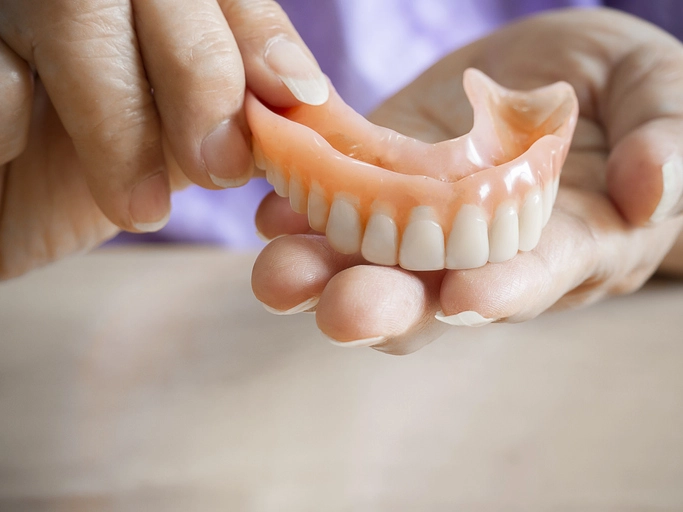You know when your shoes don’t fit right? They pinch, rub, and make every step miserable. Dentures are no different. When they’re not sitting right, your mouth sends out all kinds of distress signals like sore spots, slipping, even headaches.
But here’s the thing: most people don’t realize these little annoyances are your mouth’s way of waving a red flag. It’s not just about comfort; a bad denture fit can mess with how you eat, talk, and even your confidence. Your mouth has a lot to say, and it doesn’t whisper, it nags until you listen.
So, if you’re dealing with denture drama, it’s not just “part of the deal.” It’s a message. Let’s break down the signals your mouth is sending and how to fix them before they get louder.
How can a poor denture fit affect speech and chewing?
A poor denture fit can significantly impact everyday functions, such as speech and chewing, often leading to discomfort, embarrassment, and even nutritional deficiencies. Dentures are designed to mimic natural teeth, but when they no longer fit properly, they can interfere with the way your mouth moves and functions.
Here’s how a poor denture fit can affect speech and chewing:
- Slurred or Muffled Speech: Loose dentures can shift while talking, making it difficult to pronounce words clearly, especially the sounds “s,” “f,” and “th.”
- Clicking or Whistling Sounds: Ill-fitting dentures often create awkward noises during speech, which can be distracting and embarrassing.
- Difficulty Chewing: A Poor fit can reduce bite efficiency, making it hard to break down food properly and affecting digestion.
- Avoidance of Certain Foods: Individuals may avoid foods that are chewy, crunchy, or tough, which can lead to an unbalanced diet and potential nutritional gaps.
- Sore Spots and Pain: Constant movement of dentures can irritate gum tissue, causing discomfort while eating or speaking.
Maintaining a proper fit is essential for confident speech, effective chewing, and overall oral health. If you notice changes, it’s a sign your dentures need adjusting or replacing to support your daily function and comfort.
What are the signs that dentures are causing oral strain?
When dentures don’t fit properly or aren’t functioning as they should, your mouth works overtime to compensate leading to oral strain. This strain can impact not just your gums and jaw, but also your overall oral health and comfort. Recognizing these early signs can prevent long-term damage and unnecessary discomfort.
Here are common signs that your dentures may be causing oral strain:
- Jaw Fatigue or Soreness: A constant aching or tired feeling in your jaw may indicate that your dentures aren’t aligning correctly, causing your muscles to overwork.
- Frequent Mouth Sores or Irritation: Ill-fitting dentures can rub against soft tissues, leading to painful pressure points and inflammation.
- Loose or Shifting Dentures: If your dentures move while speaking or eating, your mouth compensates by clenching, which strains muscles and joints.
- Headaches or Neck Pain: Tension from an improper bite can travel beyond the mouth, resulting in pain in the head, neck, or even the shoulders.
- Difficulty Chewing or Speaking: Struggling with basic functions often indicates your dentures are no longer in sync with your mouth’s natural movements.
If you notice any of these symptoms, it’s time for a professional denture evaluation to restore comfort and protect your oral health.
Why do dentures sometimes feel loose or tight without warning?
Dentures can suddenly feel loose or tight without warning due to natural changes in your mouth and underlying bone structure. These shifts are often subtle and gradual, but their effects on fit can feel immediate and uncomfortable.
Here are the common reasons behind this sudden change:
- Jawbone Shrinkage: After tooth loss, the jawbone gradually resorbs (shrinks) over time. This can cause dentures that once fit perfectly to become loose.
- Gum Tissue Swelling or Shrinkage: Changes in illness, medication, or diet can affect your gums, causing temporary inflammation or shrinkage that alters the denture fit.
- Weight Fluctuations: Gaining or losing weight can alter the structure of your face and oral tissues, which can affect how dentures fit in your mouth.
- Wear and Tear: Over time, the denture base or teeth can wear down or warp, leading to an altered fit even if your mouth hasn’t changed.
- Improper Bite Alignment: Small shifts in bite pressure from daily use can gradually alter the alignment of dentures, leading to sudden discomfort or tightness.
Suppose your dentures begin to feel unexpectedly loose or tight. In that case, it’s a sign your mouth and dentures are no longer working in harmony and a professional adjustment or reline may be needed.
How does the shape of the mouth influence denture comfort?
The shape of your mouth plays a crucial role in how comfortable and stable your dentures feel. Since dentures rest directly on the gums and underlying bone, even subtle variations in the oral structure can significantly affect fit, function, and long-term comfort.
Here’s how mouth shape influences denture comfort:
- Ridge Height and Width: A well-defined, tall ridge provides better support and suction for the denture to grip. A flat or narrow ridge can make the denture more prone to slipping or shifting.
- Palate Contour: The shape and depth of the roof of your mouth (palate) affects how the upper denture seals. A flatter palate may reduce suction, leading to looseness.
- Jaw Alignment: If the upper and lower jaws don’t align properly (malocclusion), it can create uneven pressure points, causing discomfort and inefficient chewing.
- Tissue Thickness and Resilience: Softer or more delicate gum tissue may be more prone to soreness and irritation from denture pressure or movement.
- Bone Resorption Over Time: As the bone beneath the gums shrinks, it alters the mouth shape, making previously well-fitting dentures feel loose or unstable.
A customized fit that takes your unique mouth shape into account is crucial for denture comfort and function emphasizing the importance of regular evaluations and adjustments.
Listen to Your Smile: Understand Denture Fit Signals
Your mouth speaks volumes through sore spots, slipping, or changes in chewing and speech and we’re here to help you interpret those signs. An improper fit isn’t just uncomfortable; it can impact your overall oral health and quality of life.
Our team specializes in precise adjustments, relines, and replacements that restore both comfort and confidence. If your dentures are trying to tell you something, don’t ignore them.
Let us ensure your smile stays secure, supported, and as natural-feeling as possible! Schedule your visit with us today!

